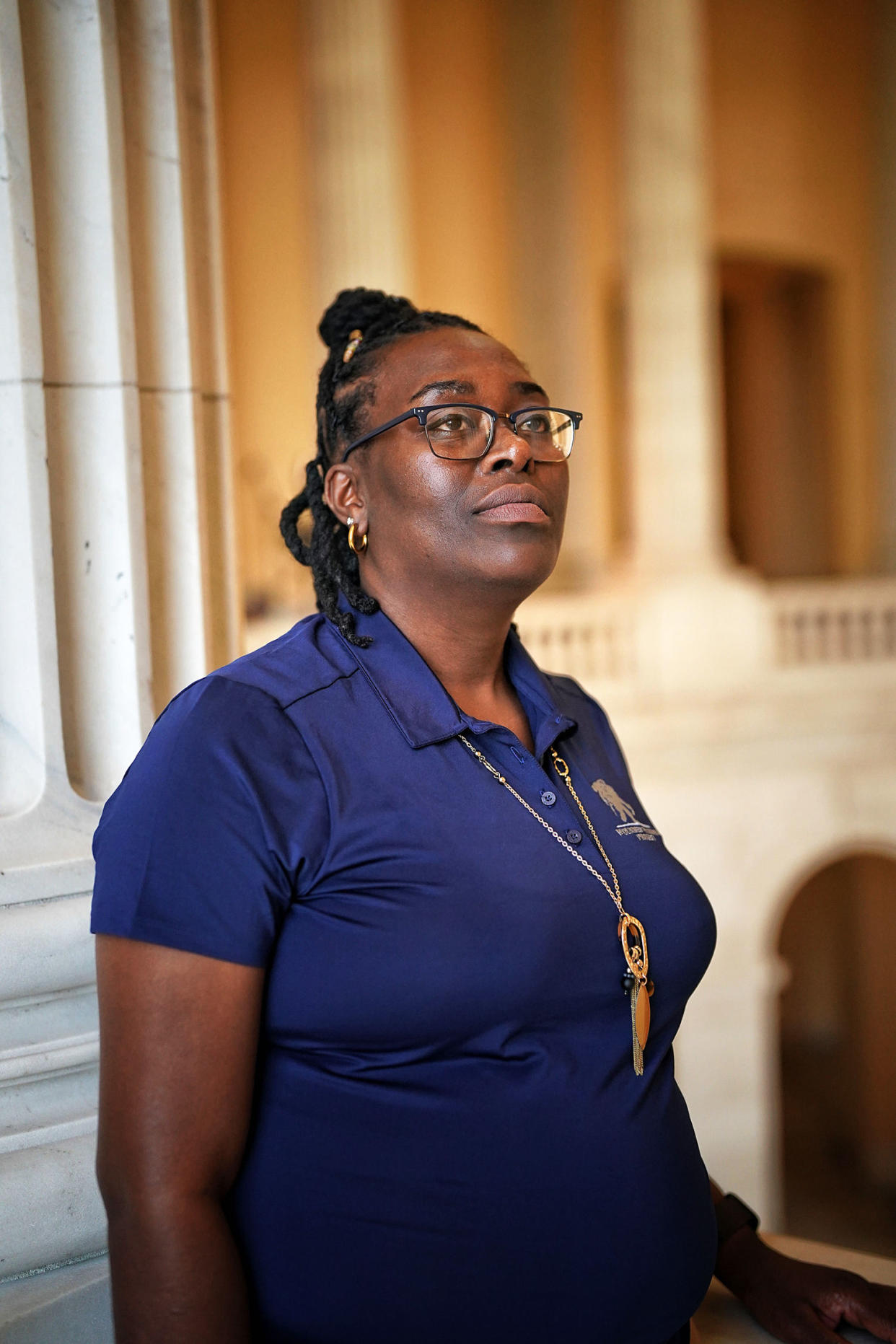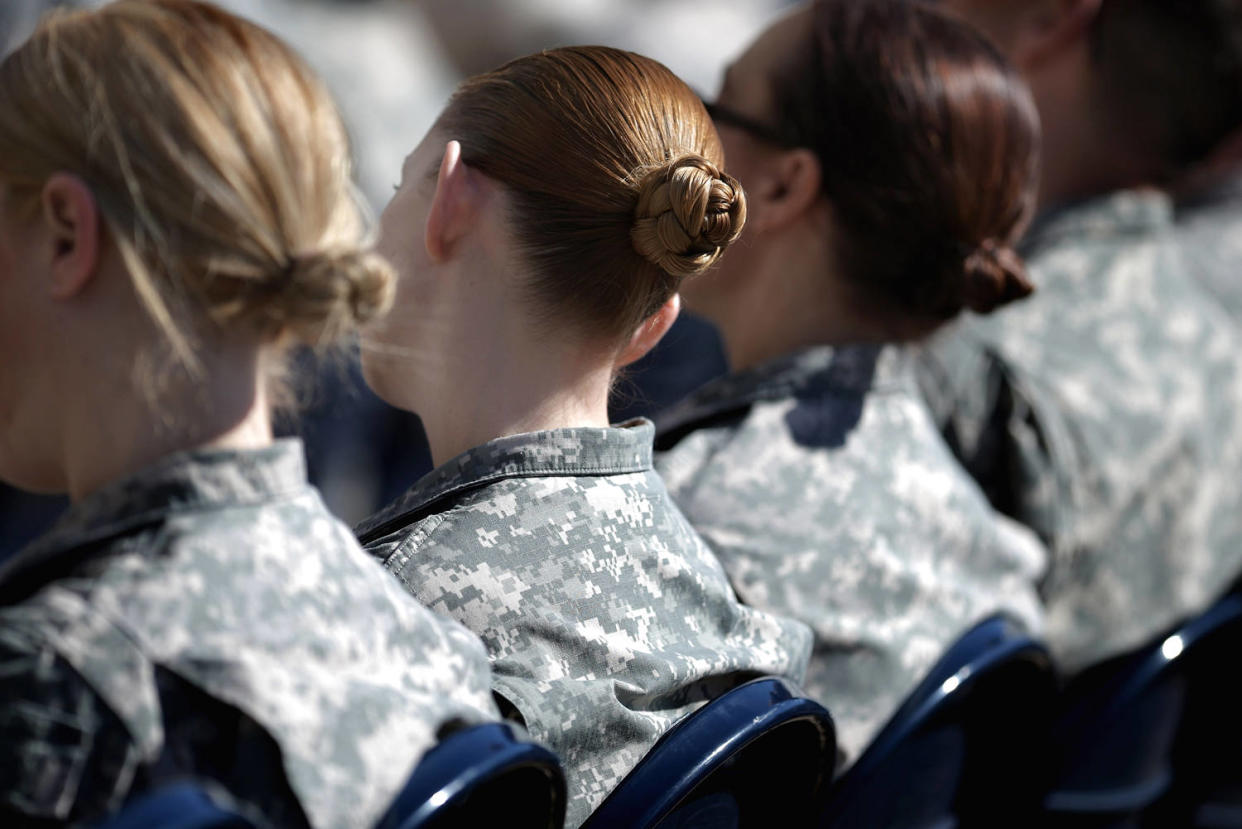Women veterans lobby Congress as a new study shows the barriers they face
WASHINGTON — Valerie Lewis has a message for Congress on behalf of fellow female veterans: Our numbers are growing, but government support isn't keeping pace.
Lewis, a combat veteran, was among dozens of veterans on Capitol Hill this week pressing lawmakers to do more. In doing so, they described how they've felt left behind by the agencies built to support them, which aren't always equipped to handle the unique issues facing women in the military.
“This is not some new concept that just came about within the last 10 to 20 years. We’ve been here since day one,” Lewis told NBC News in an interview in the U.S. Capitol.

Her sentiments and those of her fellow advocates are supported by a new report from the Wounded Warrior Project, a nonprofit group that helps veterans and active-duty members.
The study, billed as the most comprehensive report surrounding women in the armed forces, focused on topics ranging from mental health and transition from military service to financial wellness and access to care.
According to the findings, female veterans are more likely than their male counterparts to experience moderate to severe symptoms of depression, post-traumatic stress disorder and anxiety — statistics that are supported in numerous studies of nonveteran women, as well.
Additionally, the Wounded Warrior Project found, women reported sexual trauma at a rate more than three times higher than male veterans but said they received related care less often through the Department of Veterans Affairs.
“I myself am a survivor of it,” said Lewis, who served in the U.S. Army and the Georgia National Guard for almost a decade. “But due to the culture of the military, I didn’t report it because I knew I would have a harder time if I reported it than the person that actually assaulted me."
"So when it comes to mental health, they might send this out to somebody that’s a mental health professional, but I don’t want to see a guy — and a lot of times these doctors are men," she continued.
Compared to male veterans, women are more likely to seek care through the VA but face more barriers than men do, the report found. Gender-specific care, which includes routine mammograms and OB-GYN checkups, is difficult to come by, and some VA clinics do not offer these services, according to the report.
“When I got out, I could not get an annual female checkup from the VA. They sent me out to community care,” Lewis said, adding that getting an appointment could take months. “To this day, there are still a lot of health needs that I have that I have to go out for community care.”
In a statement, the VA said that it could not comment on Lewis’ specific case, but noted that the department offers care to veterans through eligible community providers when it is unable itself to provide the care needed.
The VA said it would review the WWP report “in detail,” adding that, “While VA and the Biden-Harris Administration have taken steps to dramatically expand and improve women’s health care at VA in recent years, we can and must continue to improve — and we are always listening to and learning from women Veterans to do exactly that.”
“Every time a woman Veteran comes to VA for care or benefits, it’s our mission to provide them with the world-class service they deserve,” the VA continued. “These heroes deserve the very best, and anything less is unacceptable.”
The VA noted that women are “among the fastest growing Veteran demographics” and said that its own data also “shows women report experiencing military sexual trauma at higher rates than men” and that “VA will stop at nothing to ensure that these survivors receive everything that they have earned and deserve.”

Lewis traveled to Washington, D.C., this week with dozens of female veterans to demand help from legislators.
The women shared their personal, and sometimes painful, experiences in the hopes of galvanizing bipartisan support.
Rana Clark, who served in the U.S. Army as an active-duty unit supply specialist before being medically separated because of an injury, said she had a difficult time finding resources that were available to her while integrating back to her civilian life. “I personally struggled, very, very much with my transition,” she said.
Clark said that she grappled with her mental health and had abused alcohol while trying to find a job and manage her disability. She described transitioning out of service as “like losing a leg, losing part of your soul … trying to figure out what makes you happy, how to be happy and how to be a productive member of society is very, very challenging.”
The Wounded Warrior Project report found that women veterans face higher rates of unemployment than male veterans and women in the general U.S. population, despite being more educated on average. More than 72% of women veterans reported having moderate to high financial distress, citing family and child care issues as the top barriers to employment.
Women veterans, the report found, also feel less respected than men after completing their service.
“It took me some time to actually recognize myself as a veteran,” Lewis recalled. “I’ve had instances where I walked into the VA for an appointment and they’re like, ‘Oh, what are you checking your husband in for?’ or ‘Hello sir, how are you today?’”
The report made a series of policy recommendations and the organization has worked with lawmakers on both sides of the aisle to craft initiatives.
In the middle of a government funding fight, Rep. Nancy Mace, R-S.C., has found time to huddle with freshman Democratic Rep. Nikki Budzinski, of Illinois, to discuss the issue. Both lawmakers met with a group of women veterans Tuesday.
“There’s so much work that we have to do,” said Mace, adding that she has participated in a number of panels and roundtables with women veterans.
The Wounded Warrior Project has "all this data" on women veterans' needs, she said. "They understand what their concerns are, what their needs are, and how we can help them from a resource perspective. So this could be medical care, mental health policy, jobs and unemployment, addressing all those things that are affecting our women as they transition out of active duty.”
Mace, who grew up in a military family and was the first woman to graduate from the military college The Citadel, said women have to work “twice as hard” to be treated as equal to men, sharing a personal anecdote that her fiancé is often mistaken as the member of Congress when she brings him to the Capitol.
Women, Mace said, “have to be extra loud in getting our points across and making sure that we can address issues of women and military veterans.”
She accused leadership at the VA of having a “lack of understanding” as to what veterans deal with on a daily basis but vowed to work with colleagues to craft policy that would match recommendations put forward by Wounded Warrior Project.
Budzinski, a member of the Veterans Affairs Committee, said that even veterans issues — a topic that enjoys bipartisan support in Congress — have been politicized, and warned that the looming government shutdown could negatively impact an already strained VA system.
“What it would mean if we were to shut down is an inability for the VA to be able to recruit future staff and solve that staff shortage issue, but also to train people that are within the VA to provide that gender-specific care that out women veterans really need,” she said.
“We need to rise to this occasion in Congress and make sure that we’re fully invested in our veterans," Budzinski said.
